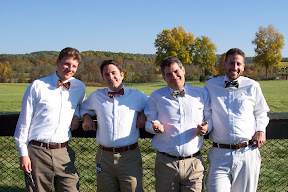This was the original intent of my blog, to document things I learned at lectures but tended to forget almost immediately. Hence, Note To Jon.
Tonight was the first opportunity I had to attend this years
Capital Science Lectures at the Carnegie Institution of Washington. Michael Gazzaniga of UCSB presented a lecture on neuroscience called Brains, Minds, and Social Process. It actually turned out to be about a new Law and Neuroscience project Dr. Gazzaniga is co-Directing (Sandra Day O'Connor is the Honorary Chair -
no Darren, not Sarah Connor).
He touched on the idea that the brain makes a decision before we are even conscious of the decision and the implications that this has for free will and by extension the idea of legal responsibility. He addressed how neuroscience would be related to persistent vegetative states like Terry Schiavo's, or to the concept of bias such as the Duke lacrosse case. But my goal isn't really to attempt to recap the lectures just record a few of the memorable highlights.
One quote I liked: "Man may think he is great, but to a mosquito we are just something to eat."

He had done a lot of work with people whose connection between the two hemispheres of their brain had been severed. He described a
split-brain experiment that was performed. They show people two images and have them focus in between them. In all brains everything on the left of the focal point is processed by the right hemisphere and vice versa. In split-brain patients the left hemisphere would literally have no knowledge of what the left eye saw. The experiment would show a chicken foot on the right and a snowy driveway on the left. The patient then had to point to one of 4 images which was most closely related to the object in front of them. There was a chicken in front of the chicken foot and a shovel in front of the snowy driveway. When asked to point the split-brain patient could correctly point to the shovel and chicken with the corresponding hand (left eye sees snowy driveway, right hemisphere processes and sends signal to left hand to point to shovel). What gets interesting is when the patient is
asked why they picked a chicken and a shovel. Only the left hemisphere processes speech, and the left hemisphere has no knowledge of the snowy driveway, but it still serves as an interpreter and tries to come up with the most plausible excuse that it can. So verbally the split-brain patient would explain "The chicken foot is associated with the chicken and the shovel is needed to clean the shit out of the chicken coop".
You can measure the brain response of a patient experiencing various emotions, "Pride", "Envy", "Pity" will have a unique brain signature in a given person. What is interesting (and disturbing) is that if the patient is shown an image with someone in an extreme outgroup (e.g. a drug addict) these emotions aren't registered at all. The brain shows no response, as if the person in the outgroup isn't even human.
Another interesting philosophical experiment that was posed was the
trolley problem. The wiki explains it better than I will, but here were my notes:
You are a passenger on a trolley that is out of control and hurtling down a track towards five people tied to the track by a mad philosopher (that was from the wiki, but I loved the phrase so I am borrowing it). There is a flip you can switch to divert the train off to a side track that has one person tied to it. Should you flip the switch? 89% say it is morally right to flip the switch.
The second scenario is that you are on a footbridge above the trolley track and see it coming toward the five people tied to the track. You realize you can stop the train if you drop a very heavy object on the track. Conveniently a very fat man happens to be standing next to you and is the only thing heavy enough to stop the train (you yourself are not fat enough to jump down and stop the train). Should you push him off to save the 5? 11% say it is morally right to push the fat man.
So what's the difference? Do we have a special place in our hearts for fat men? To me, I suppose it is because you are actively killing the fat man and in the first case you are simply flipping a switch (which will likely lead to someone's death, but that was the mad philosophers doing, and who knows maybe the person on that track will somehow get untied in time - hey I'm an optimist).
Our prison population consists of 20-30% psychopaths and 65-85% people with Antisocial Personality Disorders.
Dr. Gazzaniga believe courtrooms will be shifting over from having psychiatrists and psychologists testifying about what they "think" to having neuroscientists testifying about what they "know".
Anybody still reading this :-p
 Pardon me while I get a little sappy. In my friend’s Journal of Discovery he mentions recalling three good times you had this week. Thankfully I have far more than three moments to be grateful for, but I had an experience yesterday along those lines that I wanted to make a note of.
Pardon me while I get a little sappy. In my friend’s Journal of Discovery he mentions recalling three good times you had this week. Thankfully I have far more than three moments to be grateful for, but I had an experience yesterday along those lines that I wanted to make a note of. 




